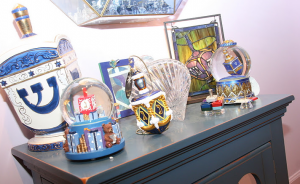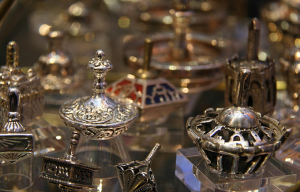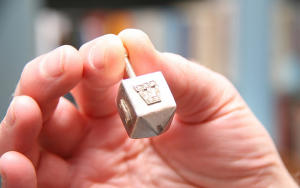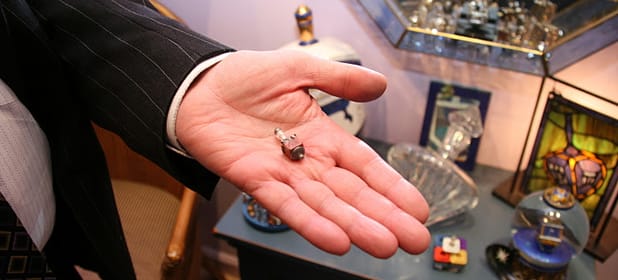Dreidel, dreidel, dreidel. I made it out of clay….

A trinket. A spinning top. A delight to captivate the innocent with the story of Chanukah. If this is all the dreidel is, then it would indeed be nothing more than a toy to engage children while the latkes fry in the pan.
But, as is often the case, the truth is much more interesting, telling, and delightful than that. At first glance, a dreidel, whether glass, clay, wood or ceramic is a simple thing. A top, engraved with simple letters. Spin it and, hopefully!, collect your chocolate gelt.What could this child’s diversion teach us about God and miracles? For many, just the idea that we live in an age of miracles elicits expressions of scorn. “Miracles?” they ask, “they are nothing but the illusions of the young and of the primitive, people who knew nothing of cell phones and iPads.”
“The laws of science and nature guide our world,” they proclaim. And I agree. Yet, I promise you that miracles happen all the time. A contradiction? Not at all. The “rub,” as Hamlet might have suggested, is with how we define a “miracle”.
A miracle is anything that “should not” happen in the logical, rational normal course of events. A miracle need not be fantastical. If we limit the things that constitute “miracles” to the “earth standing still” or events that run contrary to physical law, then we not only tarnish the laws that God has established for the physical world but we blind ourselves to the very real miracles that play out in our lives everyday.
Over three hundred years ago King Louis XIV of France asked Pascal, the great philosopher of his day, to give him proof of theexistence of miracles. Without hesitation, Pascal answered, “Why, the Jews, your Majesty. The Jews.”
History is littered with the powerful empires that worked mightily to ensure our demise – from the Akkadians to the Babylonians to the Persians to the Third Reich. Jewish history – indeed, Jewish existence – defies rational explanation. We are a miracle.
The miraculous is so essential to who we are that David Ben Gurion, the first Prime Minister of the State of Israel, said, “A Jew who does not believe in miracles is not a realist.”
* * *
 The most dramatic threats to our existence have come from external forces; the more subtle and damaging arise from within the Jewish community. Jews too often embrace cultural norms that would diminish the uniqueness of Jewish life, as when we clamored to assimilate into Hellenistic culture during the early years of the Hellenistic Empire. It was only the “miracle” of Chanukah – and by that I mean a good deal more than the oil lasting a full eight days – that once again allowed us to survive as a dedicated people.
The most dramatic threats to our existence have come from external forces; the more subtle and damaging arise from within the Jewish community. Jews too often embrace cultural norms that would diminish the uniqueness of Jewish life, as when we clamored to assimilate into Hellenistic culture during the early years of the Hellenistic Empire. It was only the “miracle” of Chanukah – and by that I mean a good deal more than the oil lasting a full eight days – that once again allowed us to survive as a dedicated people.
On Chanukah we spin dreidels upon which are inscribed the first letters of the words, “neis gadol ha’yah sham” – a great miracle happened there. (In Israel the letters on the dreidels spell out “neis gadol ha’yah po” – a great miracle happened here!) We rejoice with our dreidels, but we spin them specifically from their top part to constantly remind ourselves that Chanukah was a time when miracles came undeserved from God, when the Almighty bestowed His infinite compassion upon His people and things began to spin down to us in the form of undeniable miracles.
How surprising that the dreidel, silly top, should carry such weight – not only a theological truth and a statement about the role of the Jewish people in the miracle of Chanukah but also insight and knowledge into powerful historical dynamics. The Kabbalah teaches us another aspect of the dreidel. In this understanding, the four letters do not represent a statement about God’s presence in the world – a great miracle happened there/here – but rather they each represent one of four different historical empires – Babylonian (gimel, they attacked the Jewish body, guf, destroying the Temple and taking us into captivity), Persian (nun, known for promiscuity, they threatened our soul, nefesh), Greek (shin, empire of philosophers, the Greeks sought to prove the incompatibility of Torah with Science and Intellect, sechel.) And mighty Rome! The Roman Empire (hay) brought all four methods (hakol) in its attempt to delegitimize Judaism.
Four mighty empires. And the Jewish people? A puny gathering of people committed to study and the  performance of God’s commandments. Is it any wonder that we tremble upon the world’s stage and, when given the opportunity, we seek to assimilate and become part of these “great” cultures and empires?
performance of God’s commandments. Is it any wonder that we tremble upon the world’s stage and, when given the opportunity, we seek to assimilate and become part of these “great” cultures and empires?
But something always holds us back. Internally and externally, we are different.
So, against this backdrop of world history, are we simply spinning haphazardly from one tragedy to another? Or might there besome reason and meaning behind all the events that have punctuated our history? Our miraculous victory at Hanukah teaches us little about military strategy and everything about ourselves and God.
Without God, there are no miracles.
Which brings me to our modest little dreidel. In its modesty, it teaches us a great deal about God. Just as the dreidel spins around a central point and topples when it begins to lose its connection to that point, so too do we begin to “lose our footing” when we begin to lose our connection to our center, to God.
Spin, spin, spin.
When we face times of hardship and tragedy, the dreidel teaches us first and foremost that God is our God and we are His people. And if we believe in that ultimate meaning of the Jewish people; if we know that despite the dizzying blur of events in our history there is some purpose to the challenges we face, and if we are prepared to fight to remain Jews regardless of what history throws at us, then who knows – we might just experience a miracle and be reassured that there is a hidden hand guiding the destiny of the Jewish people.

The glory of the Maccabbees in battle with the superior Greeks was not yet a miracle. Even the oft-told story about the oil, in which a small jar found amidst the ruins of the Temple that was still sealed with a heksher attesting to its purity, a small jar with enough oil to maintain a light for a single day but which lasted a full eight days until other kosher oil could be found, is not the real miracle of Chanukah. Even these two miracles of Chanukah taken together do not represent the real miracle of Chanukah.
The real miracle of Chanukah, the one that is repeated so often in our history, is that a people who loses its way – lulled by the siren song of an appealing culture, seduced just as Adam and Eve were seduced in the Garden – and assimilates, losing the distinction of being God’s chosen, once again finds itself. For the gematria of the letters on the dreidel teach us that the arc of history is tied together in challenge and miracle.
The gematria of “gimel, nun, shin, and hay” is 358. 358 is the same gematria as nachash, the serpent in the Garden. But if that was its only truth, the lesson of the dreidel would be harsh. We are uplifted by the knowledge that 358 is also the gematria of Mashiach, the Redeemer of the Jewish people at the end of time.
Though the world is much with us, we see that the dreidel represents the history of the world from its inception until the end of time, history which began when the serpent (nachash) seduced Adam and Eve, and continues as the serpent continues its seduction through the ages of man until, at the end of time, the serpent will be finally vanquished by Mashiach.
Our history is, indeed, miraculous. And yet…and yet…this sense of miracle is so mighty as to cause us to overlook the small miracles, the delightful miracles, that occur each and every day. Which brings us, once again, to the simple and fun little dreidel.
Everyday miracles. Kindness to a spouse. Charity to those in need. Visiting an elderly and lonely neighbor. A warm smile to a stranger. These too are miracles. Small acts which have the potential to change the lives of others.
My growing, personal collection of dreidels not only keeps my sense of wonder and delight fresh and young but is a constant

reminder of the small miracles of life. Every day, I see God’s miracles – in my wife’s kindness, a mother’s kiss, a grandmother’s doting smile, a father’s proud expression. I see a community caring for itself and for others.
The world is filled with miracles great and small. Miracles are part of the Jewish world and experience. From Sinai and thesplitting of the Red Sea, miracles are part of our national history. Our “…national memory helps Jews believe in miracles, and develop a stronger relationship with God.”
And so we spin, spin, spin delightfully in the world, aware of the miracles large and small which give our lives meaning, none greater than that God has reached out to us and made us His special people.
The words of this author reflect his/her own opinions and do not necessarily represent the official position of the Orthodox Union.

